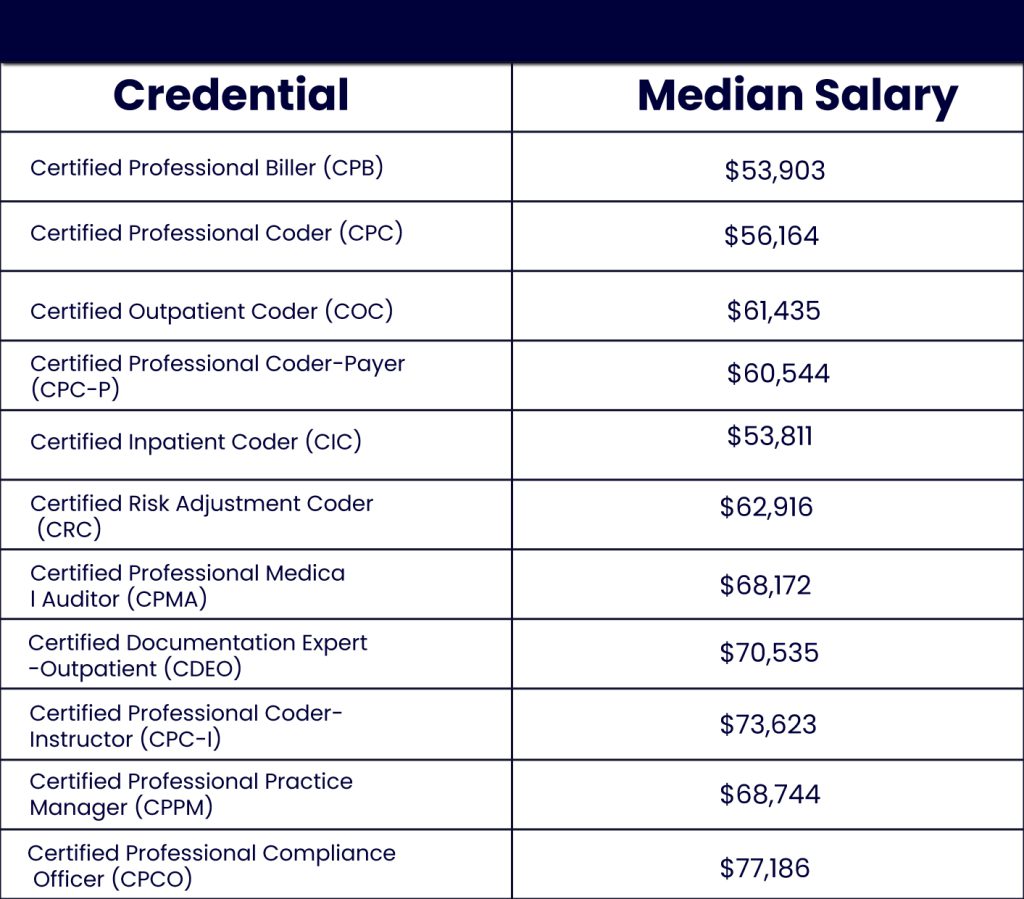

Understanding Medical Coder Salary: What You Need To Know
The medical coder salary is a crucial aspect for anyone considering a career in the healthcare industry. With the increasing demand for healthcare services, the role of medical coders has become more vital than ever. This article will explore the various factors that influence a medical coder's salary, including education, certification, experience, and geographic location. As we delve into this topic, you will gain insights into what you can expect in terms of compensation in this rewarding field.
As the healthcare sector continues to expand, the need for skilled professionals who can accurately code medical records is becoming paramount. Medical coders play a significant role in ensuring that healthcare providers are reimbursed for their services, making their expertise invaluable. Understanding the salary landscape can help aspiring medical coders make informed decisions about their career paths and financial expectations.
In this article, we will break down the components that contribute to a medical coder's salary, providing you with a comprehensive overview. From entry-level positions to advanced roles, we will cover everything you need to know to navigate your career successfully. So, let's dive in!
Table of Contents
- Biography of a Medical Coder
- Factors Influencing Medical Coder Salary
- Average Medical Coder Salary
- Medical Coder Salary by State
- Certifications and Their Impact on Salary
- Career Prospects for Medical Coders
- Job Description of a Medical Coder
- Conclusion
Biography of a Medical Coder
Medical coding is a profession that requires a unique skill set and a keen understanding of healthcare systems. Medical coders are responsible for converting healthcare diagnoses, procedures, medical services, and equipment into universal medical alphanumeric codes. These codes are used for billing and insurance purposes, making the accuracy of medical coding essential.
| Data Personal | Details |
|---|---|
| Name | Medical Coder |
| Occupation | Healthcare Professional |
| Responsibilities | Assigning codes to medical procedures and diagnoses |
| Education Required | High school diploma, associate degree, or certification |
| Average Salary | Varies based on experience, location, and certification |
Factors Influencing Medical Coder Salary
Several factors can influence the salary of a medical coder, including:
- Education and Training: The level of education and specialized training plays a significant role in determining salary. Coders with an associate degree or higher tend to earn more.
- Certification: Obtaining relevant certifications, such as Certified Professional Coder (CPC) or Certified Coding Specialist (CCS), can lead to higher pay.
- Experience: Like many professions, experience can significantly impact salary. Entry-level coders typically earn less than those with several years of experience.
- Location: Geographic location can affect salary due to variations in the cost of living and demand for healthcare services.
Average Medical Coder Salary
The average salary for medical coders can vary widely based on several factors. According to the U.S. Bureau of Labor Statistics (BLS), the median annual wage for medical records and health information technicians, which includes medical coders, was approximately $44,090 as of May 2020.
Here are some statistics that highlight the average medical coder salary at different experience levels:
- Entry-level (0-1 years): $35,000 - $40,000
- Mid-level (2-5 years): $45,000 - $55,000
- Experienced (5-10 years): $60,000 - $70,000
- Highly experienced (10+ years): $75,000+
Medical Coder Salary by State
Medical coder salaries can differ significantly from one state to another due to variations in demand, cost of living, and healthcare infrastructure. Here’s a breakdown of average salaries in some states:
- California: $56,000
- Texas: $50,000
- New York: $58,000
- Florida: $47,000
- Illinois: $53,000
Certifications and Their Impact on Salary
Certifications can greatly enhance a medical coder's salary potential. Some of the most recognized certifications include:
- Certified Professional Coder (CPC): Offered by the American Academy of Professional Coders (AAPC), this certification is highly regarded and can lead to higher pay.
- Certified Coding Specialist (CCS): Offered by the American Health Information Management Association (AHIMA), this certification is also beneficial for career advancement.
- Certified Coding Associate (CCA): This entry-level certification can help new coders establish their credentials.
Career Prospects for Medical Coders
The demand for medical coders is expected to grow in the coming years, driven by the expansion of the healthcare industry and the increasing complexity of medical billing. Here are some career prospects for medical coders:
- Opportunities for advancement to managerial roles
- Possibility of specializing in areas such as inpatient coding or outpatient coding
- Ability to work remotely, offering flexibility in the workplace
Job Description of a Medical Coder
The primary responsibilities of a medical coder include:
- Reviewing clinical statements and assigning standard codes using classification systems
- Ensuring the accuracy of codes to facilitate proper billing and reimbursement
- Communicating with healthcare providers to clarify documentation as needed
- Staying updated on coding guidelines and regulations
Conclusion
In summary, the medical coder salary is influenced by a variety of factors, including education, certification, experience, and location. With the healthcare industry continuing to grow, the demand for skilled medical coders is expected to rise, offering numerous career opportunities. If you're considering a career in medical coding, obtaining relevant certifications and gaining experience can significantly enhance your salary prospects.
We encourage you to share your thoughts in the comments section below and explore other articles on our site for more insights into healthcare careers!
Final Thoughts
Thank you for taking the time to read this comprehensive guide on medical coder salary. We hope you found it informative and helpful in your career journey. Don’t hesitate to return for more valuable content!
Hidive: The Ultimate Destination For Anime Streaming
Finish What You Started: The Key To Achieving Your Goals
Best Headphones: Your Ultimate Guide To Choosing The Perfect Pair


